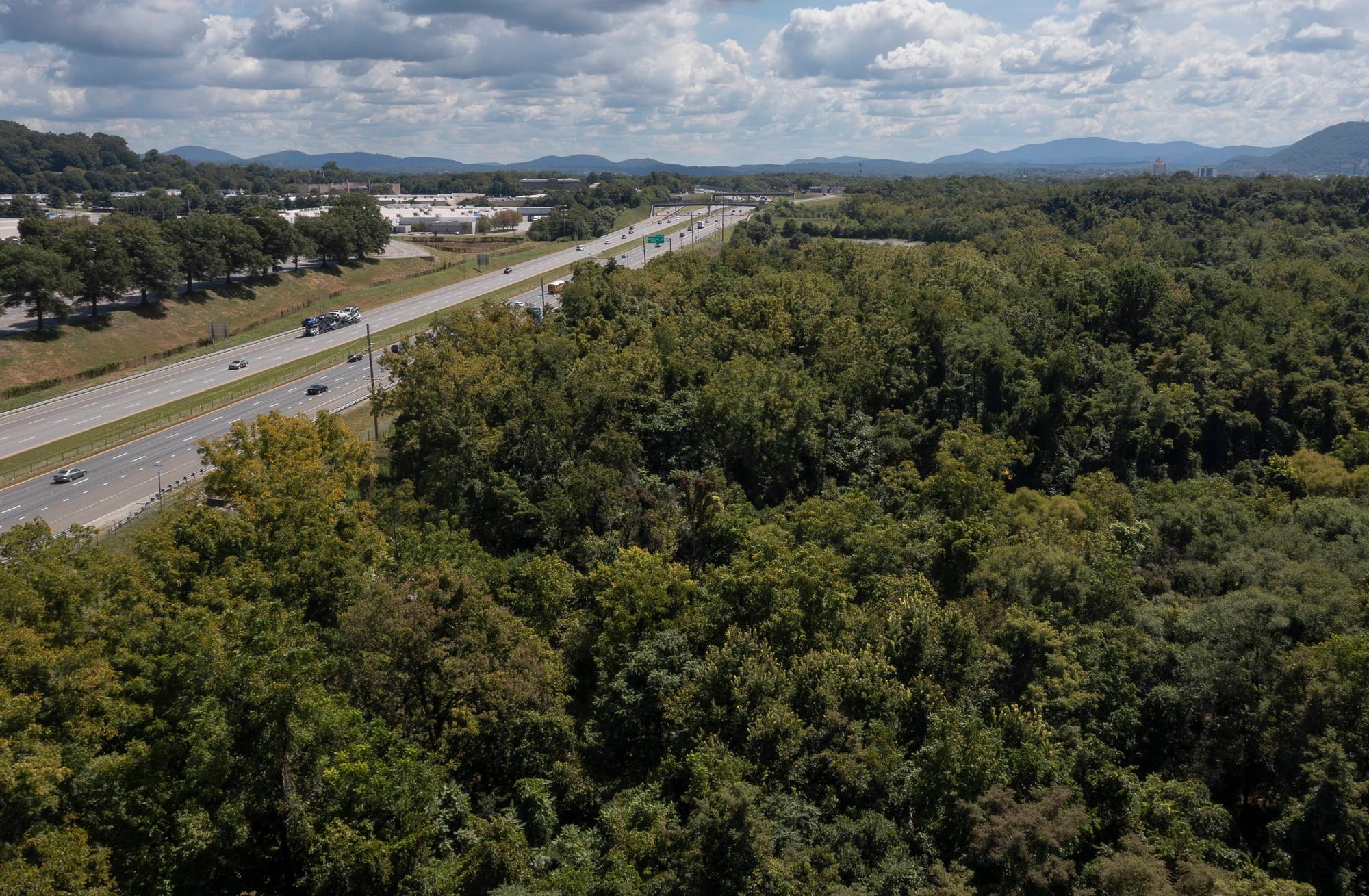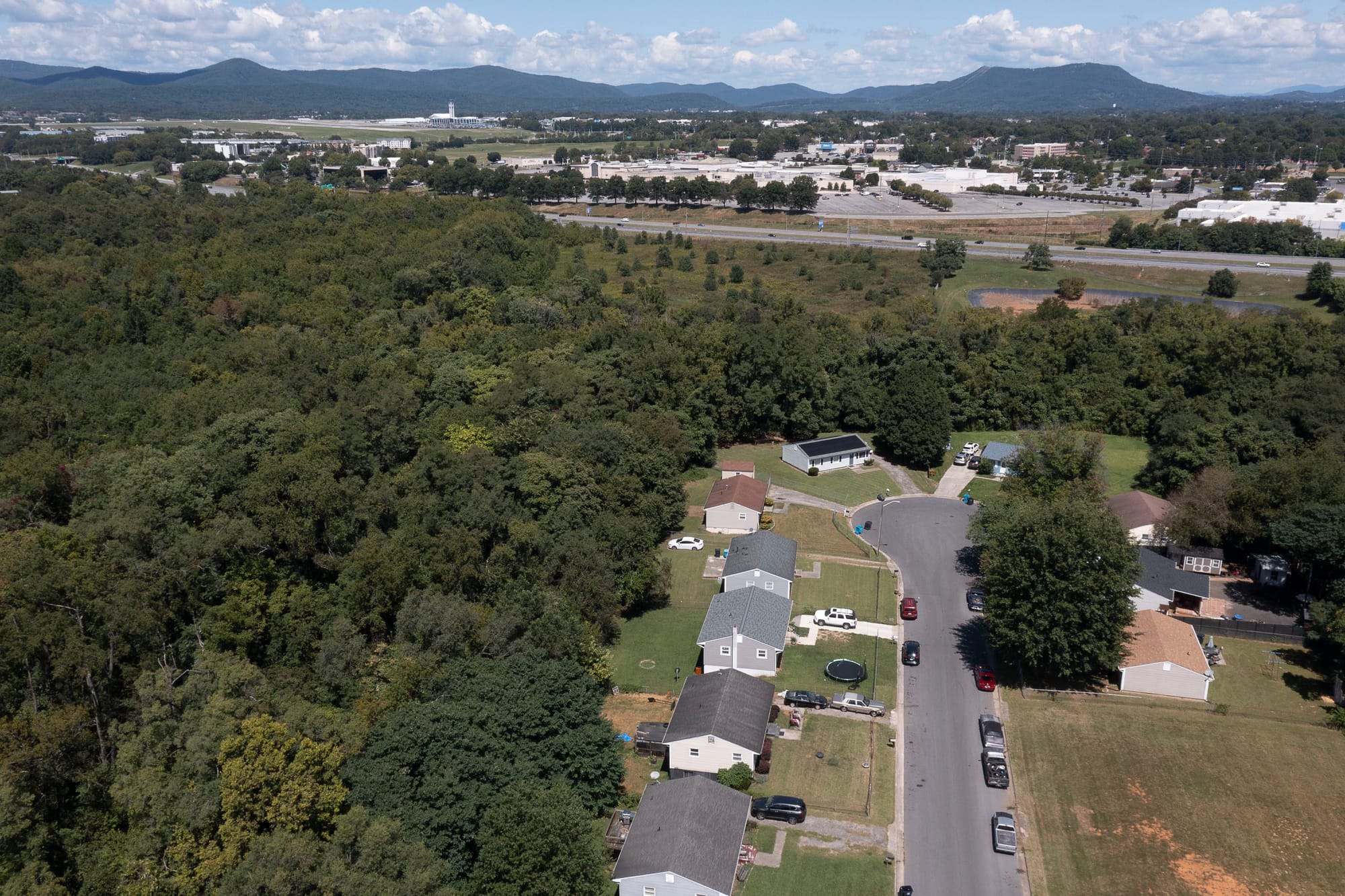New Roanoke Council Members Eye Rehashing an Old Issue: City's Evans Spring Master Plan
The 150 acres of privately-owned woodlands across from Valley View Mall is the last tract of undeveloped land of its size in the city.

A narrowly approved plan to encourage larger-scale development on the Evans Spring property across from Valley View Mall should be repealed or replaced, and a formal request to do so will be made as early as this month, Roanoke City Councilman Phazhon Nash said.
It’s time to “go back and look at other options,” he said in an interview last week.
He will seek to revise the plan through a “council member initiative” request that members now use to bring issues to the forefront, Nash said. He said he hopes a new proposal will be something “everyone can buy into. But it takes four votes.”
The council, on a 4-3 vote, adopted the Evans Spring development plan over community objections in February 2024, including three hours of opposition voiced at the meeting that night. The approval folded the development plan — which the city had commissioned from consultants — into Roanoke’s guiding land-use document.
No developer has submitted plans for acquiring and developing the land since the 2024 vote.
The 150 acres of privately-owned woodlands is the last tract of undeveloped land of its size and proximity in the city. The approved plan says Evans Spring should become a mix of big box stores, smaller shops, and hundreds of houses and apartments.
Nash said there needs to be discussion of other ideas that were part of a consultant study of the property.
A community group that formed over the debate, Friends of Evans Spring, supports the city buying the land to create a park, with open greenspace. Several members of the group did not return email and phone messages left with them by the Roanoke Rambler Tuesday.
Another possibility: developing a neighborhood hub such as Roanoke’s Grandin area, instead of big box and strip mall development.
A smaller scale, “people driven” agreement for the property is needed, whatever that may be, Nash said.
The potential for substantial real estate tax increases is another issue that needs to be addressed, he said. Property owners who live near the Evans Spring property could be faced with paying large tax bills that they can’t pay based on the current adopted plan, he said.
“We need to ensure that residents will be protected,” said Nash, who lives in the nearby Fairland neighborhood.
Mayor Sherman Lea and council members Vivian Sanchez-Jones, Peter Volosin and Trish White-Boyd voted to adopt the plan in 2024. Volosin and Sanchez-Jones remain on the council.
Current Mayor Joe Cobb, then a council member, voted against the development plan last year.
At the time, Cobb said he liked aspects of the plan, such as the potential for more housing and legal access to nature. But he expressed concerns about the loss of tree canopy and density of proposed commercial and residential development.
Cobb was on a trip to one of Roanoke’s Sister Cities this week — Wonju, South Korea.
Nash, who along with Vice Mayor Terry McGuire and Councilman Nick Hagen, campaigned against the larger-scale development plan while running for office last year. So did Evelyn Powers, who lost the election but was later appointed to the remaining two years of Cobb’s council seat. All are now in their first terms.
“We have got to stop randomly, quickly making decisions about Evans Spring,” Powers said at a July 2024 candidate forum hosted by Friends of Evans Spring. “If it can be developed, I envision that to be like a small, beautiful community, but not big box. That would just not be right.”
McGuire said Tuesday he will support Nash in the effort.
Hagen said Tuesday he has no immediate comment until he talks with Nash about the upcoming request.
Volosin said as far as he’s concerned “the plan has been dealt with.”

Controversy over the land has stewed for decades. Neighboring residents opposed to major development invoke concerns related to traffic, the environment and racial justice. Evans Spring borders three predominantly Black neighborhoods, and some see the city’s push for development as a modern-day version of urban renewal.
Proponents of development say Roanoke needs more housing to allay an affordability crisis and new amenities to boost the local economy. Consultants say a major development could create more than 2,000 construction jobs and more than 1,300 service industry jobs.
The master plan says the city could expect to reap nearly $3 million in average annual tax revenue over the next 20 years if the development is fully built out.
In 2022, the city decided to commission a plan meant to satisfy the landowners, residents and the city’s own interest in developing the land. Private property owners, the city, and Roanoke’s Economic Development Authority paid a combined $223,117 for the development plan.
A Charlottesville-based consultant, Land Planning and Design Associates, finished the master plan in December 2023, shortly after all of LPDA’s employees were hired by Kimley-Horn, one of the nation’s biggest planning, engineering and design firms.
Most of the land is currently zoned as Residential Agricultural, which the city’s zoning code says limits development to one single-family home per acre. Another section around Top Hill Drive was zoned for a denser, single-family development that never happened.
Interest in developing Evans Spring gained steam a decade ago after Virginia agreed to finance the completion of an interchange at Valley View Boulevard, making the site theoretically accessible to highway traffic. In 2013, the city adopted the “Evans Spring Area Plan,” which states that the land is best suited for a mix of residential and commercial development.
Because of residents’ firm opposition to highway traffic connecting to existing neighborhoods, the latest Evans Spring plan proposes restricting access between any commercial and residential areas to pedestrians and bicyclists.
Connecting the highway interchange to the site will require a major investment. Consultants estimated a four-lane bridge will cost as much as $75 million if constructed in 2029.
A Valley View interchange buildout project is an identified, but unfunded, project that may be added to the Roanoke Valley Transportation Plan at some point in the future, according to a city spokesperson.
Three property owners control most of Evans Spring: Heritage Acres LLC, tied to a Washington, D.C investor; Anderson Wade Douthat IV through firms affiliated with Allegheny Construction Co.; and the trust of Katherine Huff, whose family used to operate a dairy farm along the highway.

